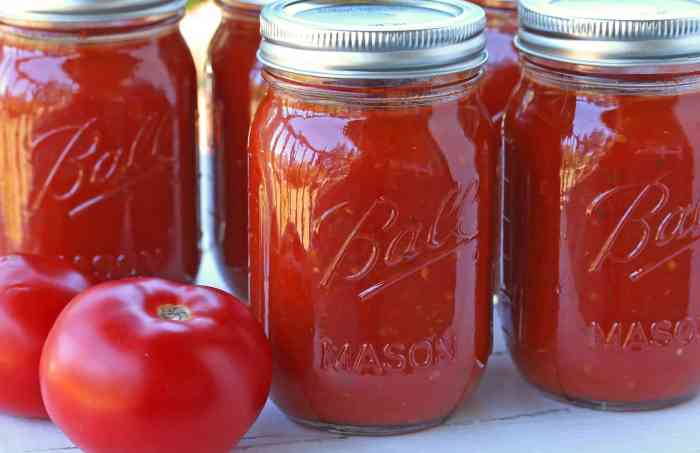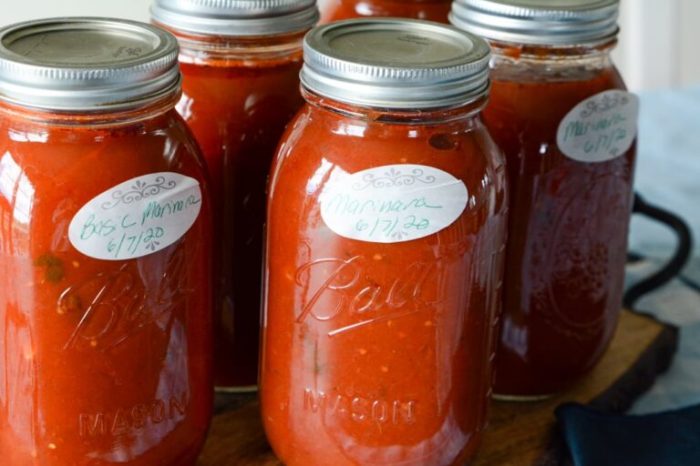Recipe for Marinara Sauce to Can
Making and Canning Marinara Sauce: A Comprehensive Guide: Recipe For Marinara Sauce To Can
Recipe for marinara sauce to can – This guide provides a detailed walkthrough of creating and canning delicious marinara sauce, emphasizing food safety and preservation techniques. We’ll cover ingredient selection, recipe variations, the canning process, storage, and creative uses for your homemade sauce.
Ingredient Selection and Preparation

Source: daringgourmet.com
Selecting high-quality ingredients is crucial for a flavorful and safe canned marinara sauce. Proper preparation ensures optimal taste and texture.
Tomato Selection: San Marzano tomatoes are highly prized for their low acidity and sweet flavor, making them ideal for canning. Roma tomatoes are another excellent choice, offering a good balance of sweetness and acidity. Avoid using heirloom varieties, as their varied acidity levels can affect consistency during canning.
Vegetable Preparation: Wash all vegetables thoroughly. Onions and garlic should be finely chopped. Herbs, such as basil, oregano, and parsley, should be finely chopped or roughly torn, depending on the desired texture.
Spice Selection and Quantities: The spice blend significantly influences the final flavor. A classic marinara typically includes dried oregano (1 teaspoon), dried basil (1 teaspoon), garlic powder (1 teaspoon), onion powder (½ teaspoon), red pepper flakes (¼
-½ teaspoon, depending on desired spiciness), and salt (1-2 teaspoons, to taste). Adjust quantities based on preference.
| Ingredient | Quantity (per batch) | Nutritional Value per Serving (approx.) | Notes |
|---|---|---|---|
| Tomatoes (San Marzano) | 2 kg | Vitamin C, Lycopene | Choose ripe, firm tomatoes. |
| Onions | 1 large | Vitamin C, Potassium | Finely chop for even cooking. |
| Garlic | 4 cloves | Allicin (antioxidant) | Minced or finely chopped. |
| Oregano (dried) | 1 tsp | Antioxidants | Adjust to taste. |
| Basil (dried) | 1 tsp | Antioxidants, Vitamin K | Adjust to taste. |
| Olive Oil | 2 tbsp | Healthy fats | Use extra virgin olive oil for best flavor. |
| Salt | 1 tsp | Electrolyte | Adjust to taste. |
Marinara Sauce Recipe Variations

Source: adventuresofanurse.com
Three distinct marinara sauce recipes are presented below, each with a unique flavor profile. These recipes demonstrate the versatility of marinara and the impact of different ingredients and cooking techniques.
Classic Italian Marinara: This recipe emphasizes the pure tomato flavor, enhanced by simple herbs and spices. Simmer time: 1-1.5 hours. Granulated sugar is used (1 tsp) to balance acidity.
Spicy Marinara: This version adds a kick with red pepper flakes and a touch of cayenne pepper. Simmer time: 1 hour. Brown sugar (1 tbsp) adds depth and complements the spice.
Herbed Marinara: This recipe highlights fresh herbs like basil, oregano, and thyme. Simmer time: 45 minutes. No sugar is added, relying on the sweetness of the tomatoes and herbs.
Canning Recipe (Food Safety Emphasis): This recipe prioritizes food safety for long-term preservation. It includes a higher simmering temperature and careful jar preparation to ensure sterility.
Canning Process and Safety
Proper canning techniques are essential for preserving the marinara sauce safely. Following these steps minimizes the risk of spoilage.
Step-by-step canning process: Sterilize jars and lids. Prepare the marinara sauce according to your chosen recipe. Fill the jars, leaving appropriate headspace. Process in a pressure canner according to manufacturer’s instructions for the appropriate altitude.
Importance of Headspace and Pressure Canning: Proper headspace prevents jars from breaking during processing. Pressure canning ensures that the sauce reaches a temperature high enough to kill harmful bacteria.
Safety Hazards and Avoidance: Avoid using damaged jars. Ensure proper sealing. Never reuse lids. Follow the pressure canner’s instructions carefully.
- Sterilize jars and lids before use.
- Use a pressure canner for safe processing.
- Leave proper headspace in jars.
- Process jars according to altitude.
- Check for proper sealing after processing.
- Store canned goods in a cool, dark place.
Storage and Shelf Life
Proper storage is vital to maintain the quality and safety of your canned marinara sauce.
Optimal Storage Conditions: Store canned marinara in a cool, dark, and dry place. Ideal temperature is below 70°F (21°C).
Checking for Spoilage: Inspect jars for bulging lids or leaks. Spoiled sauce may show mold growth, unusual discoloration, or an off-odor. A properly canned sauce will have a smooth, consistent texture and a rich, tomato aroma.
Storing Leftovers: Refrigerate opened cans and use within 3-5 days. Do not refreeze.
Visual Guide: Properly Canned Marinara: Smooth, consistent texture; vibrant red color; sealed jar with no bulging or leaks; rich tomato aroma. Spoiled Marinara: Mold growth (fuzzy or slimy appearance); off-colors (darkening, unusual spots); bulging lid; sour or fermented odor.
Recipe Adaptability and Creativity, Recipe for marinara sauce to can
The basic marinara recipe is easily adaptable to various tastes and dietary needs. Its versatility extends to a wide range of culinary applications.
Recipe Customization: Add different meats (ground beef, sausage, meatballs), vegetables (mushrooms, peppers, zucchini), or cheeses (mozzarella, parmesan) to create unique variations.
Dietary Adaptations: Vegan marinara can be made by omitting any animal products. Gluten-free marinara is naturally gluten-free.
- Pasta sauces
- Pizza toppings
- Soups and stews
- Meat sauces
- Vegetable casseroles
- Fillings for stuffed vegetables
FAQ Section
How long does canned marinara sauce last?
Properly canned marinara sauce, stored in a cool, dark place, can last for 12-18 months.
Can I use frozen tomatoes for canning?
While possible, fresh tomatoes are generally preferred for canning as they offer better texture and flavor. Frozen tomatoes may result in a less vibrant final product.
Creating a delicious marinara sauce for canning involves careful attention to consistency and acidity. A key element is achieving the perfect balance of sweetness and tang, much like you’d find in a great recipe for making pizza sauce , although marinara tends towards a less intensely flavored profile. Properly canned, your homemade marinara will reward you with vibrant flavor for months to come, ready to enhance any pasta dish.
What happens if I don’t get a proper seal on a jar?
Improperly sealed jars risk spoilage due to bacterial contamination. Discard any jars that don’t seal properly.
Can I adjust the spice level in the recipes?
Absolutely! Feel free to adjust the amount of chili flakes or other spices to suit your preference.













